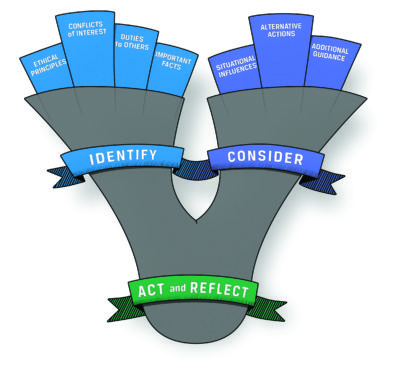Ethics in Practice: Use of Client Trading Information. Case and Analysis–Week of 11 February
How did you do evaluating this week’s (11 February) case? Check out the analysis below.
Case
Kapadia is a trader for a asset management company that manages several large global mutual funds. Kapadia executes the equity buy-and-sell orders for the portfolio managers of one of the company’s mutual funds. He has discretion to execute the orders at any time during the day depending on market conditions. Prior to executing the orders, Kapadia contacts several close friends and relatives to provide them with information on what securities are set to be traded by the mutual fund. In turn, they make trades that mirror the imminent trades to be executed by Kapadia on behalf of the mutual fund. Kapadia’s actions are
- inappropriate.
- appropriate if he disclosed his actions to his employer or to the mutual fund.
- appropriate because he did not share confidential information about individual clients.
- inappropriate only if the client was harmed financially by the conduct.
- none of the above.
Analysis
This case relates to the unethical and often illegal practice of front-running, or trading on advance information for one’s personal account prior to trading for client accounts to gain an economic advantage. CFA Institute Standard VI(B): Priority of Transactions states that investment transactions for clients must have priority over investment transactions for personal benefit. In this case, Kapadia facilitated the front-running by his friends and relatives on the trades of his employer’s mutual fund. Although Kapadia may not have directly benefited financially, he benefited personally by providing the information to those with whom he had close relationships. This practice is unethical and inappropriate even if the trades of his friends and relatives did not disadvantage the mutual fund by moving the price of the security or causing the fund to lose the price advantage or any profit from its own trades. Kapadia cannot cure this unethical behavior by disclosing his actions to his employer or the fund. Although Kapadia did not share the confidential information of individual clients or individual investors of the fund, he did share confidential information about the fund itself. Choice A is the best answer.
This case is based on a 2016 enforcement action by the Securities and Exchange Board of India.
Let us know what you think of Ethics in Practice by taking this short survey.
Have an idea for a case for us to feature? Send it to us at [email protected].
More About the Ethics in Practice Series
Just as you need to practice to become proficient at playing a musical instrument, public speaking, or playing a sport, practicing assessing and analyzing situations and making ethical decisions develops your ethical decision-making skills. The Ethics in Practice series gives you an opportunity to “exercise” your ethical decision-making skills. Each week, we post a short vignette, drawn from real-world circumstances, regulatory cases, and CFA Institute Professional Conduct investigations, along with possible responses/actions. We then encourage you to assess the case using the CFA Institute Ethical Decision-Making Framework and through the lens of the CFA Institute Code of Ethics and Standards of Professional Conduct. Then join the conversation and let us know which of the choices you believe is the right one and explain why. Later in the week, we will post an analysis of the case and you can see how your response compares.
Image Credit: ©CFA Institute


A